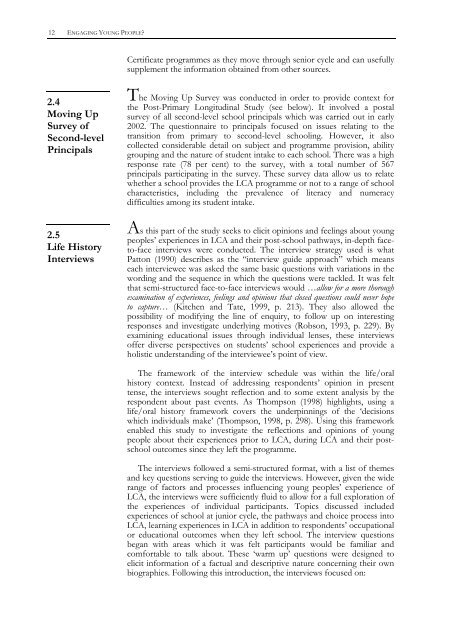Student Experiences of the Leaving Certificate Applied Programme
Student Experiences of the Leaving Certificate Applied Programme
Student Experiences of the Leaving Certificate Applied Programme
You also want an ePaper? Increase the reach of your titles
YUMPU automatically turns print PDFs into web optimized ePapers that Google loves.
12 ENGAGING YOUNG PEOPLE?<strong>Certificate</strong> programmes as <strong>the</strong>y move through senior cycle and can usefullysupplement <strong>the</strong> information obtained from o<strong>the</strong>r sources.2.4Moving UpSurvey <strong>of</strong>Second-levelPrincipalsThe Moving Up Survey was conducted in order to provide context for<strong>the</strong> Post-Primary Longitudinal Study (see below). It involved a postalsurvey <strong>of</strong> all second-level school principals which was carried out in early2002. The questionnaire to principals focused on issues relating to <strong>the</strong>transition from primary to second-level schooling. However, it alsocollected considerable detail on subject and programme provision, abilitygrouping and <strong>the</strong> nature <strong>of</strong> student intake to each school. There was a highresponse rate (78 per cent) to <strong>the</strong> survey, with a total number <strong>of</strong> 567principals participating in <strong>the</strong> survey. These survey data allow us to relatewhe<strong>the</strong>r a school provides <strong>the</strong> LCA programme or not to a range <strong>of</strong> schoolcharacteristics, including <strong>the</strong> prevalence <strong>of</strong> literacy and numeracydifficulties among its student intake.2.5Life HistoryInterviewsAs this part <strong>of</strong> <strong>the</strong> study seeks to elicit opinions and feelings about youngpeoples’ experiences in LCA and <strong>the</strong>ir post-school pathways, in-depth faceto-faceinterviews were conducted. The interview strategy used is whatPatton (1990) describes as <strong>the</strong> “interview guide approach” which meanseach interviewee was asked <strong>the</strong> same basic questions with variations in <strong>the</strong>wording and <strong>the</strong> sequence in which <strong>the</strong> questions were tackled. It was feltthat semi-structured face-to-face interviews would …allow for a more thoroughexamination <strong>of</strong> experiences, feelings and opinions that closed questions could never hopeto capture… (Kitchen and Tate, 1999, p. 213). They also allowed <strong>the</strong>possibility <strong>of</strong> modifying <strong>the</strong> line <strong>of</strong> enquiry, to follow up on interestingresponses and investigate underlying motives (Robson, 1993, p. 229). Byexamining educational issues through individual lenses, <strong>the</strong>se interviews<strong>of</strong>fer diverse perspectives on students’ school experiences and provide aholistic understanding <strong>of</strong> <strong>the</strong> interviewee’s point <strong>of</strong> view.The framework <strong>of</strong> <strong>the</strong> interview schedule was within <strong>the</strong> life/oralhistory context. Instead <strong>of</strong> addressing respondents’ opinion in presenttense, <strong>the</strong> interviews sought reflection and to some extent analysis by <strong>the</strong>respondent about past events. As Thompson (1998) highlights, using alife/oral history framework covers <strong>the</strong> underpinnings <strong>of</strong> <strong>the</strong> ‘decisionswhich individuals make’ (Thompson, 1998, p. 298). Using this frameworkenabled this study to investigate <strong>the</strong> reflections and opinions <strong>of</strong> youngpeople about <strong>the</strong>ir experiences prior to LCA, during LCA and <strong>the</strong>ir postschooloutcomes since <strong>the</strong>y left <strong>the</strong> programme.The interviews followed a semi-structured format, with a list <strong>of</strong> <strong>the</strong>mesand key questions serving to guide <strong>the</strong> interviews. However, given <strong>the</strong> widerange <strong>of</strong> factors and processes influencing young peoples’ experience <strong>of</strong>LCA, <strong>the</strong> interviews were sufficiently fluid to allow for a full exploration <strong>of</strong><strong>the</strong> experiences <strong>of</strong> individual participants. Topics discussed includedexperiences <strong>of</strong> school at junior cycle, <strong>the</strong> pathways and choice process intoLCA, learning experiences in LCA in addition to respondents’ occupationalor educational outcomes when <strong>the</strong>y left school. The interview questionsbegan with areas which it was felt participants would be familiar andcomfortable to talk about. These ‘warm up’ questions were designed toelicit information <strong>of</strong> a factual and descriptive nature concerning <strong>the</strong>ir ownbiographies. Following this introduction, <strong>the</strong> interviews focused on:

















